Just a few days ago while perusing new Cool Mom Picks Instagram followers (hey, thanks new followers!), I clicked over to the Sesame Place Instagram feed and noticed something pretty surprising in their bio:
Photos using #sesameplace become property of Sesame Place
In other words, use a hashtag to identify the location of your photo, which is common practice, and you’ve inadvertently given a brand ownership of your photo.
Maybe.
Now that’s something I’ve never seen before, and as a parent, this troubles me.
(Update: The Sesame Place team has responded and removed their statement from their Instagram page. Keep reading for more information)
There’s been no shortage of discussion about photo ownership, credits, and appropriate usage when it comes to Instagram photos, and for good reason. Whether it’s intentional or not, photos are frequently shared without properly crediting the original creator or photographer. It happens by regramming without tagging the original creator, or simply by grabbing random images off the Internet without researching its source. It also happens when users intentionally remove a watermark from the image to try and claim credit for someone else’s work. This happened to us with this image. A lot.
Some not cool stuff brands have done with your Instagram photos
When brands are involved, matters get even more complicated. Especially because Instagram users often tag brands when they want the attention or the shares. But not always. And that can backfire on everyone, like a case this past summer in which Crocs used a child’s photo on their website without permission or credit after it had been hashtagged #Crocs by the user.
Or take the situation with Travel & Leisure magazine earlier last year, when they incorporated a photo from photographer Melvin Boecher’s Instagram feed into an online article with a name credit — but no link to his website, TravelDudes (which really annoys online publishers and can even cost them potential business), nor offering compensation of any kind.
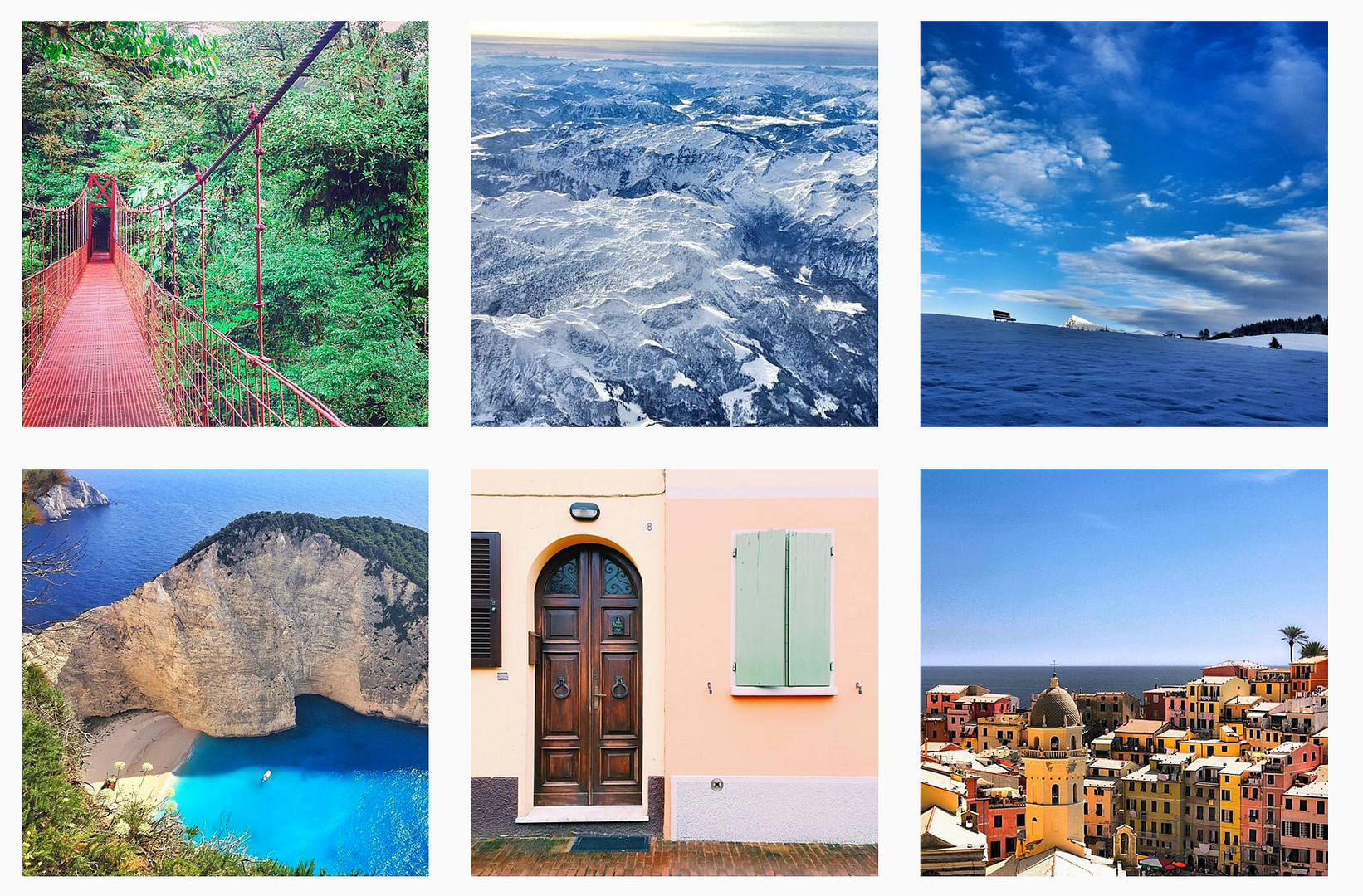
From the @TravelDudes Instagram feed. Gorgeous! We can see why someone might want to repost it.
The publication stated that their “non-legal policy,” which includes their social media terms and conditions, allows them to do this. However, this policy was not published anywhere on their Instagram page at the time.
Now, they’ve added a link to their T&C page in their Instagram bio — knowing full well that it’s not actually a clickable link.
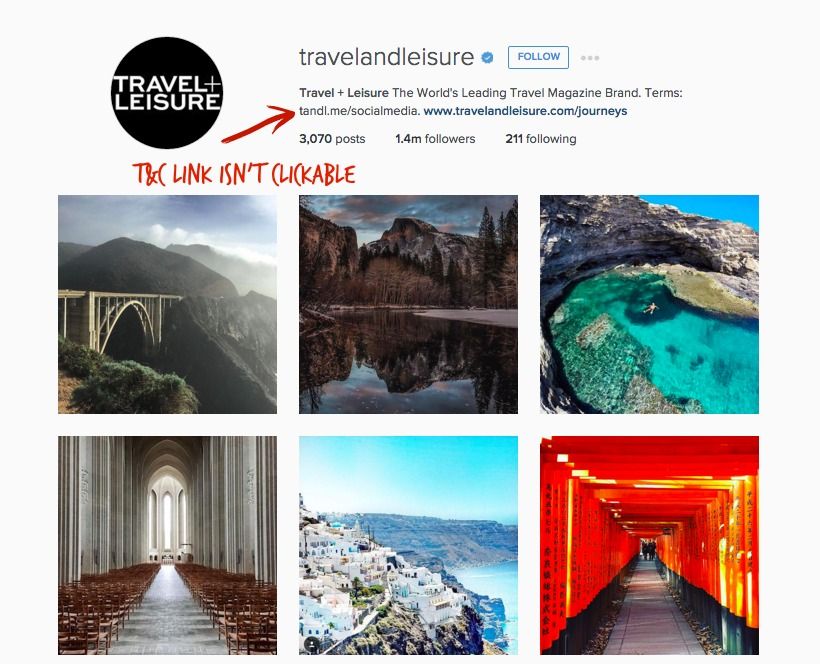
Here’s an excerpt, which may be a shock to most people:

Let’s highlight the part that really freaks us out, beyond the perpetual restricted license:
By posting, you agree that we may identify you as the author/source…however we might use any really good ideas…without any attribution or compensation to you.
That means, your home, your family, your child could appear on the cover of Time Inc’s Travel & Leisure Magazine, Food & Wine, or Departures, your photos in their pages, your personal images in their national advertising. All without getting a penny or a drop of acknowledgement. Free content for them, just because they say so. And you know, it’s in “the spirit of community.”
No it’s not. It’s in the spirit of “we don’t want to pay for photography and we’re bigger than you so don’t challenge us.”
The kicker however: The last line of their T&C policy:
In no event will we be liable hereunder for extraordinary, consequential, indirect or punitive damages, including lost profits. The end.
The issue with the Sesame Place Instagram terms
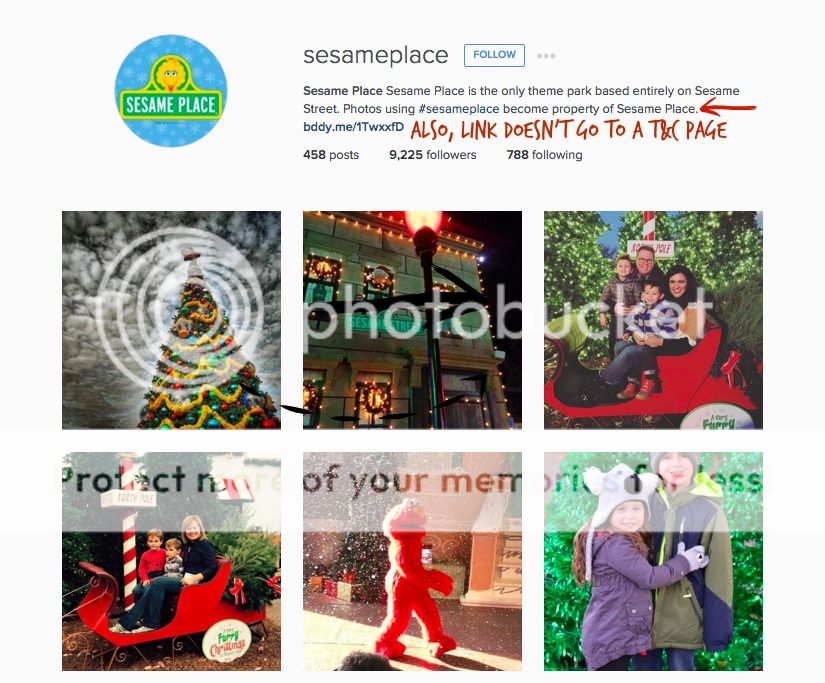
Now let us start out by saying we have no beef with Sesame Place. My kids love it there, I take them all the time, and I love their support of military families. I’m simply taking issue with a legal concern that may or may not have been thoroughly considered by their social media team.
However by claiming legal rights to a location hashtag on Instagram that’s widely in use according to social media tagging norms — #SesamePlace, #WaxMuseum, #CentralPark, #LasVegas — this creates a ton of potential problems for the brand as we see it.
- First, they’re claiming ownership rights — not just reposting rights — simply because a photo was hashtagged.
- Second, do these rights extend retroactively? If you posted a photo three years ago with the hashtag #SesamePlace, does the park have the right to claim ownership of that photo?
- Third, we’re concerned that they’re doing this with photos that feature children. And while there’s always some argument as to whether you are setting yourself up for this if you post photos of your children, we disagree that parents are “asking for it” or behaving recklessly.Posting a personal photo does not, nor has it ever constituted willingness to have you or your children used in an ad as a spokesperson or endorser, without permission or compensation. Especially if you’re entering into this agreement unwillingly and without explicit agreement and acknowledgment of terms.And while of course many parents would be thrilled to have their children represented in the social media feed of a beloved brand like Sesame Place, they might not want that same photo appearing in a national television spot or on a giant billboard on the highway.
- Finally, I’d imagine plenty of Instagram users are simply using the hashtag as a standard practice for connecting with others at a location, and are not even thinking to check the main feed page of Sesame Place in order to read the terms of using their hashtag.In fact, from our research, Sesame Place’s disclaimer doesn’t even seem like it would hold up legally.While you can trademark a hashtag — which is a separate legal action from trademarking your brand name — even then, you cannot limit it to your own private use.
From the Socially Aware blog:
The USPTO defines a hashtag as “a form of metadata comprised of a word or phrase, prefixed with the symbol #.” And states that a hashtag mark may be registerable, but only if it functions as an identifier of the source of the applicant’s goods or service.
We’re not lawyers, but the way we see it, there are a whole lot of issues with a disclaimer as simple as “we own your photos.”
- Beyond the legalities, is it really a good idea for brands to turn off their most devoted fans, followers and evangelists by using their photos without explicit permission? It seems like this could backfire in a number of ways, including limiting the number of users who will use your hashtag at all when word gets out.There are definitely better solutions.
(Edited to add) Should you find your photos illegally used, reach out to the brand nicely at first and ask them to remove the photo. You may be surprised how apologetic and responsive a lot of people are about this, especially because they don’t want bad blood with their fans.
Then again, sometimes they are not nice or responsive. In which case you can always file a DMCA Takedown notice, for usage in violation of the Digital Millenium Copyright Act.
The Bad News for Instagram users
Unfortunately, there’s no perfect way to police a brand’s use of your photos at this time, except to hope that you have vigilant friends and family who will notice a photo that looks strikingly like yours is in use elsewhere.
The Federal Trade Commission can really only get involved if Instagram itself violates their own Instagram Terms of Use. (Which you should read by the way!)
But when it comes to brands and companies using your Instagram photos for marketing purposes, well, it’s much fuzzier. In my research, brands who have a specific, accessible social media policy about sharing or reposting are in the minority right now. And if “tag us and we own your photos” start to become the standard that other companies will emulate, then this definitely needs more attention from Instagram users like you.
So what can Instagram users do? (a.k.a. The Good News!)
Of course, you always have the option of taking your Instagram account private or not using hashtags. Turn the show off. Change the channel. I get it. But as far as we’re concerned, that’s like blaming the victims. We think that individuals have the right to maintain public profiles and still keep their photos safe from unwanted usage by brands. In which case, you have a few options:
Related: 15 Instagram tips everyone should know
1. Search hashtags before you use them
A quick click on a hashtag will show you how it’s being used and by whom, and really, it’s a smart approach no matter what. I mistakenly used #AmericanGirl after visiting the NYC store with my daughters and let’s just say there are lots of…surprising things that pop up.
2. Look for hashtags dedicated to sharing and reposting
Many brands are wisely creating specific hashtags for users who want to have their work regrammed. We admire brands like @Food52 which offers a specific hashtag to users like #F52grams for those who would like their own photos shared with credit.
So far, 1.1 million photos have used this hashtag so clearly it’s not that hard to get the word out — Food52 includes it in every single photo description they post.
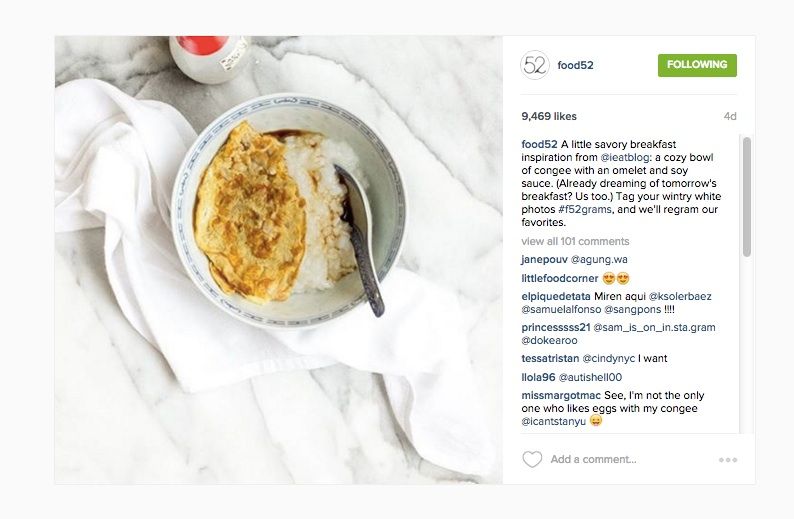
In other examples, Ilana Wiles of Mommy Shorts created a dedicated crowdsourced meme around @averageparentproblems. She makes it clear that if you want your photo included, to use the #averageparentproblems hashtag, and then you’ll be credited in the description (though not on the photo itself).
Or sometimes there are brands that have specific hashtag-based campaigns in which they solicit photos using a hashtag, like Calvin Klein, which asked users to share underwear photos using the hashtag #mycalvins (and yes, it’s racy). There are close to a quarter-million photos with the hashtag, and those that are reposted on the Calvin Klein Instagram feed are credited to the original photographer. As it should be.
2. Check bios and profiles of brands you engage with
Just like checking the common use of a hashtag, clicking over to a brand’s profile page from time to time is a smart move, as more brands and companies are starting to create policies and add terms and conditions specific to photo use and crediting.
Granted, they’re not all there yet, and you will need to use your judgment if you don’t see a policy, but it’s definitely worth the quick click to be sure you’re on board with their terms.
3. Watermark your photos

It can be a little time consuming, but if you’re an avid Instagram user and you still want to interact with brands, it may be worth spending the energy to watermark your photos which makes photos harder to share or steal.
It’s not that hard to do, but you may want to determine how to best do it so that the mark doesn’t interfere with the aesthetic of your photo. Just know that if you place it on the side or bottom of your photo it may make it more shareable, however unscrupulous people can still cut it off and repost. Or you can do what Onica Cupido of The Mommy Factor does on all the pictures she shares of her son, by watermarking them prominently through the center. And they’re still cute photos!
You can also use Instagram watermark apps which offer a variety of styles, as described in this post from ReadWrite. Marksta, developed by a photographer himself, looks really promising (as shown here).
4. Create your own policy
I highly recommend creating your own policy and placing it right in your profile. You don’t get a whole lot of room, so you’ll need to make it short and sweet, but it’s definitely smart to specify exactly what people can and can’t do with your photos. If you have a blog or website, it’s also smart to have a copyright line on all pages, as well as a separate terms and conditions page with your policy. Bonus: Consider linking to it on all your social media pages.
Here’s mine from my personal Instagram account. I know enforcing it might be challenging, but at least it’s it in writing so if someone does use my photo, I can demonstrate that my policy was violated.
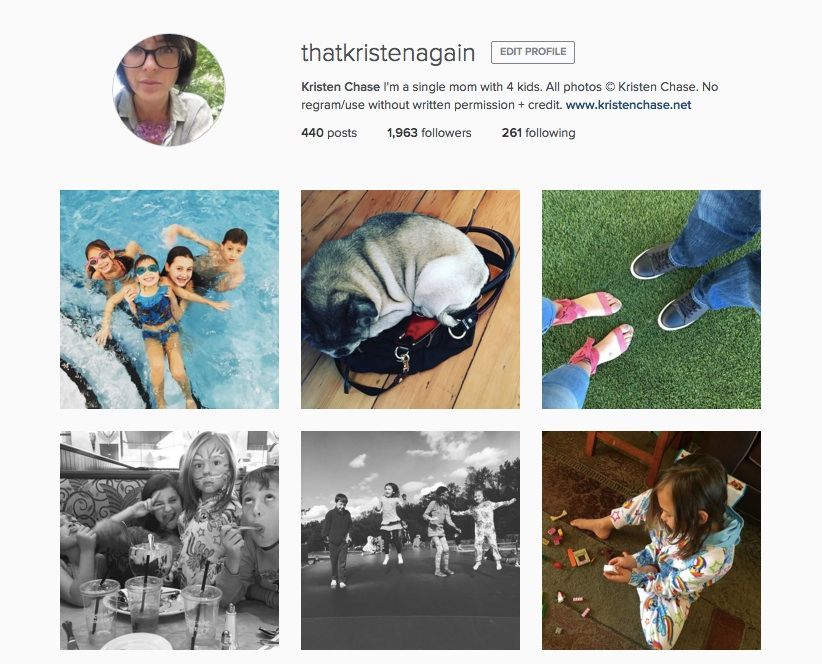
5. If you’re a parent, talk about this stuff to your kids
We talk so much about teaching our kids to use caution and thoughtfulness when sharing their own photos, but we may not remember to discuss the etiquette and legalities of sharing someone else’s photos and content.
If you’ve got kids on Instagram like I do, it’s important to include a conversation about social media shares and basic copyright law in your ongoing tech talk with them. In fact, our own kids are learning this now in grade school as part of their library curriculum. You might be surprised to know that your kids already know some of the basics, and just need some parental guidance on all the ways it applies.
Essentially, we not only want our kids to make safe, smart choices, but we also want them to be good social media citizens. And ideally, do better than some of the brands out there are doing.
A quick word of advice to brands
If you want use of crowdsourced content, be sure to make those terms and conditions abundantly clear to your users.
Also, create a dedicated hashtag for it. Now! Immediately! Try #sesameplaceshares or #sesameplaceregam or #sesameplaceOK. That way, you’re sourcing content from willing fans, who will be delighted to see their photos selected. Everyone wins.
-Kristen with Liz

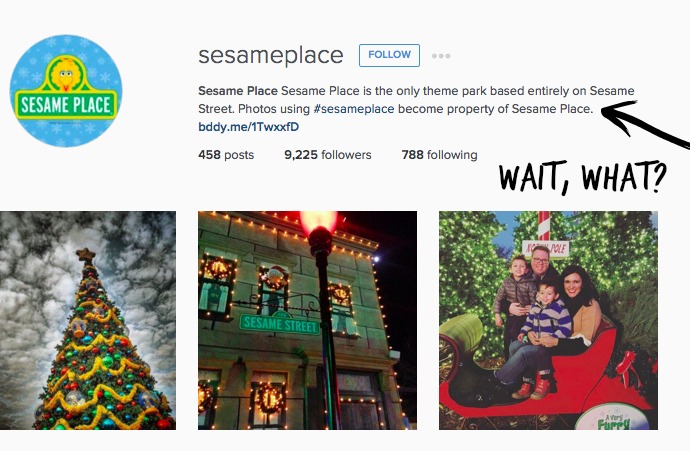

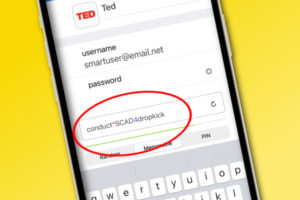



So if your Instagram account is set to “private”, does this take care of the problem? I’m assuming that only my followers can see my photos and that mine won’t come up in a search of a hashtag that I use…
—
Yes Diana, private Instagram accounts can only be seen by your approved followers. Even with hashtags. -Eds
Totally illegal and in violation of US Copyright Law. When you take the picture and “fix” it in digital form (ie: it exists) you own the copyright to that work.
You cannot waive that except through written transfer or through a license such as creative commons. Brands can’t use any sort of fancy T&C through a 3rd party without your knowledge or consent because it’s not reasonable to assume you’d have read the T&C of a hashtag.
All you need to do is submit a DMCA claim and your photos would, once again, be just yours.
It sucks that some brands are trying to rip off their consumers by stealing their photos. Thanks for bringing more awareness to this issue. I do try to watermark most of my photos. You can never be too safe these days when it comes to protecting your content.
A quick note, simply making your account private will NOT always protect you. Even if your account is private, images you post with a hashtag will still show up in a search of that hashtag.
Hi Anne, that’s not quite true. The images will only be seen by those who have permission to follow you.
https://help.instagram.com/273447449440719
If you have other information we’re not aware of, we’d love to see it.
Great article, I thought I would add that a user, company or individual, can make any proclamation they would like, but that does not mean it is in any way legally binding. This is no-different than the dubious Facebook status that proclaims that Facebook can’t use use your status or images, when in fact their TOS specifically state that they can…on their platform.
There is no mechanism to own a hashtag and posting a link, clickable or otherwise, to a proclamation of ownership wouldn’t be considered conspicuous notification to users uploading images, from their own device and not via any interface related to the person/entity asserting rights and while using common words that wouldn’t even qualify for a trademark. No where in law is there any language, that I have ever read, that says tagging, mentioning, or otherwise notifying someone constitutes any binding agreement to release your rights, particularly if a persons likeness is involved. You see, if YOU aren’t the person in the picture YOU cannot give away someone else’s model release rights.
If it’s your photo you have the right to serve a DMCA take down notice to Instagram.
Thanks for the confirmation Kevin, very helpful. We’ve updated the post with DMCA takedown info — though we’d always recommend approaching a brand or other social media user amicably at first.
So glad you covered this issue and gave examples of how parents can be aware when sharing photos (brand related or not) via social media. Just because we share freely doesn’t mean we give up the rights to say how photos of our families can be used.
That is one of the main reason’s I watermark my photos. Thanks for understanding that and sharing it with your readers : )
Thanks for shining light on this issue. Shame on those brands for their shady behavior! They want to steal ideas and images and profit off of someone else’s work!
I’m not sure how I landed here but I’m so glad I did. I have an instagram account for my website and I would be furious if a company took ownership of one of my photos and/or didn’t attribute it to me.
I have a photo policy on my website but never thought of putting one on instagram.
Thanks so much for all this valuable information.
Does your opinion change if brands share photos that have been added to their Facebook or Yelp page? It seems to me if you upload a photo to a business page, you are giving them that photo, and they should be able to use it without reservation.
Good question Julie! I think it depends on the terms of service / reshare policy as listed on the Facebook page. There’s also a difference between social media (owned media) and paid media use, like using a quote of yours in a TV commercial over your photo with your name attributed.
No such thing as no reservation though; if they’re using it to mock you or to suggest an endorsement that would cause issues. So much grey area — good stuff for us to research a little more.
Interesting. We are always quick to share and like, but may not be aware of the lasting effects. The takeaway? protect your photos and your kids and be careful.